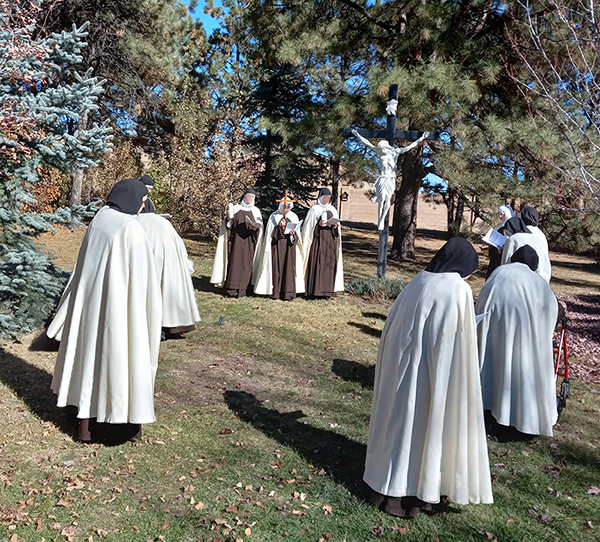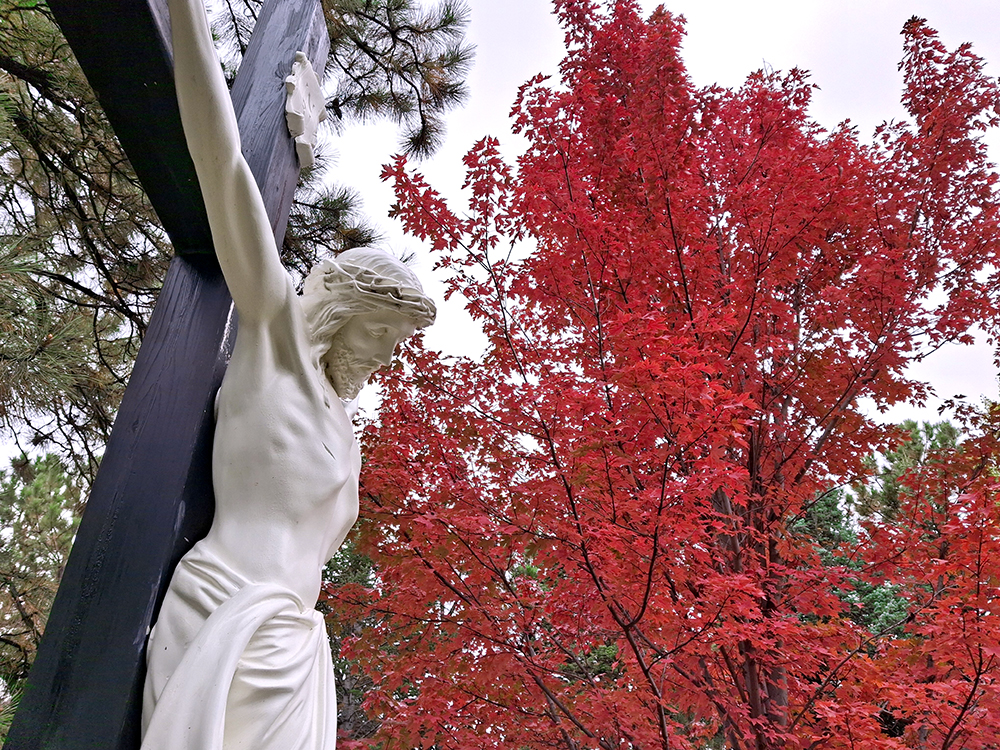
St. Teresa and the Holy Souls
“In mental prayer the soul is purified from its sins, nourished with charity, confirmed in faith, and strengthened in hope; the mind expands, the affections dilate, the heart is purified, truth becomes evident; temptation is conquered, sadness dispelled; the senses are renovated; drooping powers revive; tepidity ceases; the rust of vices disappears. Out of mental prayer issues forth like living sparks, those desires of heaven which the soul conceives when inflamed with the fire of divine love.”
– St. Peter of Alcantara, spiritual director of St. Teresa of Avila
Dear Friends of Carmel,
Today (October 15th) is a great day! It is the Feast of St. Teresa of Avila, a beautiful feast day for the Church and especially for all Carmelites. Happy Feast day to all of you! So much could be said about our great patron, Our Holy Mother! But in this brief letter, we will confine ourselves to focusing on the one great characteristic of her life: prayer. Her writings on prayer, which offer much instruction and counsel to those who want to learn to converse with God, are among the most renowned among all the Saints and Doctors of the Church. Five centuries after her death, souls are still benefiting from this great teacher of the spiritual life.

This book is our go-to book for those first learning the practice of mental prayer; it is such a wonderful and simple, yet complete, summary of St. Teresa’s instruction. In the author’s own words: “What St. Teresa has done so brilliantly is to describe precisely how a person can indeed contact God through prayer….she was a practical person, and that practicality shines through her teaching about prayer.”

Another pocket-sized summary all about prayer and St. Teresa’s teaching on the subject. Written in question and answer format, it covers everything from what prayer is, how to practice it, as well as a section on common difficulties people experience (such as distractions) and what is meant by “the practice of the presence of God.”

This summary of St. Teresa’s “Way of Perfection” is written by the author of Divine Intimacy, Father Gabriel of St. Mary Magdalene, O.C.D. He discusses the different forms of Christian prayer with a special emphasis on St. Teresa’s famous line by line meditation on the “Our Father.”
Prayer is essential in the spiritual life. So true is this, that St. Teresa stated that souls who pray will be saved, because if they are praying seriously, they will either be led to give up prayer or give up sin; “I am certain of it that Our Lord will eventually bring to the harbor of salvation, the soul who gives himself to prayer” (St. Teresa, Life). But personal sanctification was not her only motive for her intense spiritual life. In the beginning of her book, The Way of Perfection, she lays out her reasons for the Carmelite reform and for encouraging her daughters in the way of prayer and spiritual perfection. She lived at the time of the Protestant revolution, when many Catholics across Europe were being torn from the body of the faithful and falling into heresy. How much she lamented this loss of souls! The thought stirred up the zeal in her apostolic soul:
“O God of my soul, how we hasten to offend You and how You hasten even more to pardon us! What reason is there Lord, for such deranged boldness? Could it be that we have already understood Your great mercy and have forgotten that Your justice is just? The sorrows of death surround me. Oh, oh, oh, what a serious thing sin is, for it was enough to kill God with so many sorrows! Everywhere mortals wound You.

“O Christians, it’s time to defend your King and to accompany Him in such great solitude. Few are the vassals remaining with Him, and great the multitude accompanying Lucifer. And what’s worse is that these latter appear as His friends in public and sell Him in secret. He finds almost no one in whom to trust. O true Friend, how badly he pays You back who betrays You! O true Christians, help your God weep, for those compassionate tears are not only for Lazarus but for those who were not going to want to rise, even though His Majesty calls them. O My God, how You bear in mind the faults I have committed against You! May they now come to an end, Lord, may they come to an end and those of everyone. Raise up these dead; may Your cries be so powerful that even though they do not beg life of You, You give it to them so that afterward, my God, they might come forth from the depth of their own delights.
“Lazarus did not ask You to raise him up. You did it for a woman sinner; behold one here, my God, and a much greater one; let Your mercy shine. I, although miserable, ask life for those who do not want to ask it of You. You already know, my King, what torment it is for me to see them so forgetful of the great endless torments they will suffer, if they don’t return to You.”

The work of prayer is not a merely selfish one, for our own needs, our own perfection, our own union with God. Rather, when rooted in the fullness of Christian charity, it overflows and profits the entire Church. We do profit from it, yes. But when it is united to Christ, it becomes the work of Christ and the work of His Church for all souls. “Love your neighbor as yourself.” How beautifully this commandment is fulfilled when we pray for one another. If our own miseries and misfortunes are not enough to stir us to prayer, let us only look at the world around us and be moved with compassion for our suffering brethren, for those without the comforts and hope of the Faith, for those floundering to find meaning and purpose in life.
Our days are not so different from those of St. Teresa. The Faith, Christian society, is being attacked and crumbling on so many fronts. God has confided to us the treasures of our holy religion, and it is our responsibility to pray (as St. Teresa says above) for those who do not know how to, or won’t, pray for themselves.
Remember Your Deceased Loved Ones

And how beautifully this is expressed, as well, by prayer for the souls in Purgatory – those who truly cannot pray for themselves. Our Holy Mother had a great devotion to the Holy Souls and instilled it in all Carmelites the same. The De Profundis (Psalm 129) is prayed several times every day by the Sisters, both before and after meals, as well as during other times of procession. Vespers of the dead is recited once each week (usually on Mondays) after the proper Vespers of the day, and there is a special procession, with chants and prayers, for the Holy Souls on November 2, All Souls Day. This procession is for us the most solemn and prayerful of the year.

If you have not already done so, we urge you once again to enroll the names of your beloved departed to be placed upon our chapel altar during the month of November, the month especially dedicated to the Holy Souls, that they may be remembered in all of the Masses offered here – and benefit from the many prayers offered on their behalf. Even if you are not able to make a donation, we still invite you to send us your names.
Know of our prayers for all of you as well, our brothers and sisters in Christ, our fellow members of the Mystical Body, as we celebrate the Feast day of our great Patron and Mother, St. Teresa of Avila. May she bless each one with her zeal for souls and love of the Church. May she continue to guide us in this fight for Christ our King, for His rights and glory on this earth: “Thy Kingdom come, Thy will be done, on earth as it is in Heaven!”
In Him,
Your Carmelite Sisters
